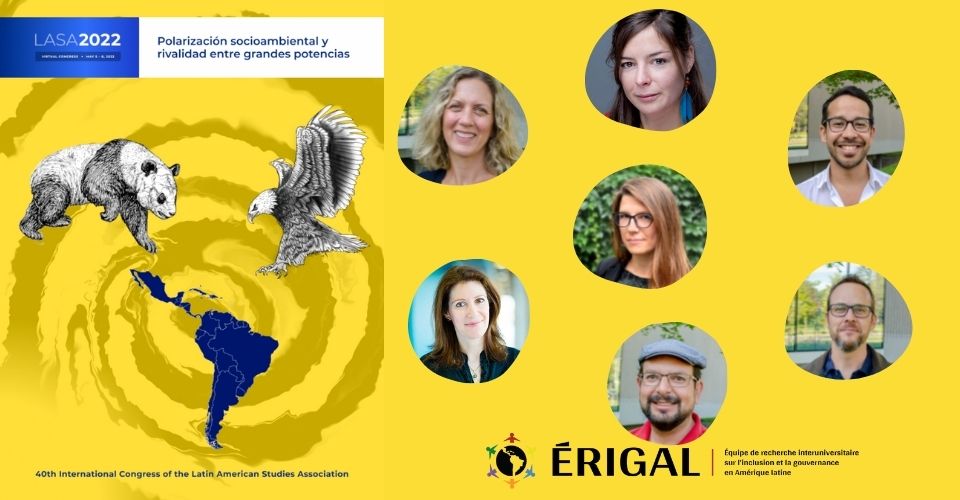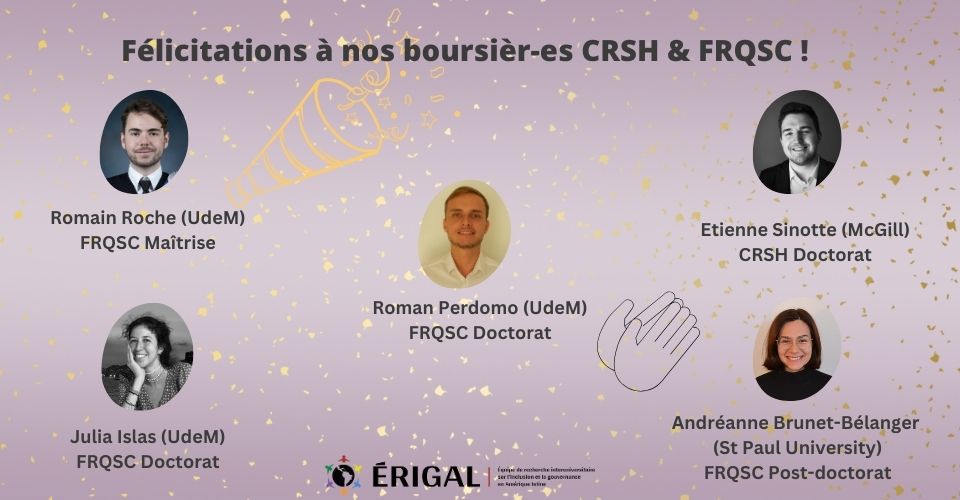ERIGAL team at LASA Congress 2022 !

Last week, several ERIGAL professors participated in the annual conference of LASA (Latin American Studies association), held online from May 5 to 8, 2022, on the theme of socio-environmental polarization and great power rivalry.
On Thursday morning, our director, Françoise Montambeault (Université de Montréal) participated in a panel organized by Adrian Gurza Lavalle, on the effects of the right turn and political crises in Latin America. She presented her research about the deinstitutionalization of participatory institutions in Brazil, between democratic erosion and resilience.
On the same day, Tina Hilgers (Concordia University) participated as a discussant in a panel on the politics of crime and violence in the Caribbean and Latin America from a comparative perspective, organized by Enrique Desmond Arias, (Baruch College, City University of New York) and Angélica Durán Martínez (University of Massachusetts, Lowell).
On Friday afternoon, she also presented a paper in a panel comparing civil responses to crime and violence in the Americas, organized by Eduardo Moncada, (Barnard College, Columbia University). Her talk focused on how criminal roots structure community understandings of and responses to violence, with crime coming from both above and below.
On Thursday afternoon, Julián Durazo-Herrmann (Université du Québec à Montréal), presented a paper as part of a panel organized by Carlos Augusto Varetto (Universidad Nacional de San Martin /CONICET), on the actors, institutions and dynamics of sub-national politics, based on Latin American case studies. His presentation focused on the role of hyper-local blogs in Bahia, Brazil in mediating state-society relations.
Friday afternoon Dan Furukawa-Marques (Université Laval) coordinated a panel on internationalism as political praxis, articulating everyday actions with the construction of transnational solidarity, alongside Claire Lagier (PhD, independent researcher). The panel questioned the nature of internationalism practiced by today's social movements, , in contrast to classical or nation-based internationalism, using the example of the Landless Peasants Movement (MST) in Brazil.
On the same day, Jean François Mayer (Concordia University) coordinated a panel with Leda M. Pérez (Universidad del Pacífico) on the theme of domestic workers in South America, between power relations, violence, resistance and socio-legal changes. He also presented a paper on violence and chronic resistance in the workplace, based on the experience of domestic workers in Brazil.
On Saturday, May 8, Nora Nagels (Université du Québec à Montréal) participated in a panel on public policies in times of Covid, organized by Maria del Carmen Midaglia (Universidad de la República) presenting her research on gender and early childhood education and care policies in Costa Rica. She was also part of the Gender and Feminist Studies section, which met on Friday evening.
Finally, on Saturday morning, Charmain Levy (Université du Québec en Outaouais) participated in the panel organized by María Grazia Sibille (Pontificia Universidad Católica del Perú) on artivism, political mobilization and feminist protest. She presented a paper on women's movements and feminisms in Paraguay. She also organized and moderated a conference that compared the effects of the right and left waves in Latin America and their political and economic dynamics.
Congratulations to all of them for these contributions!


